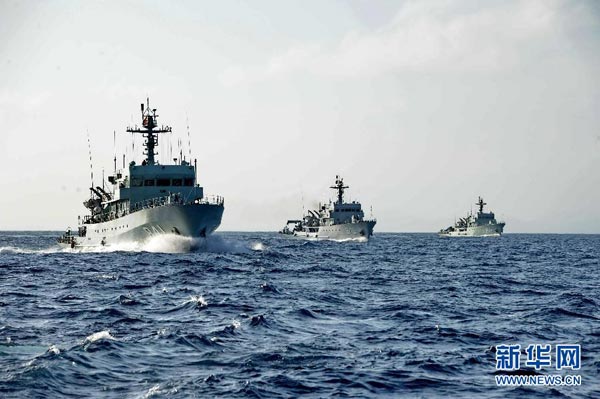

 |
| (File Photo) |
BEIJING, April 29 -- The South China Sea unexpectedly became a showcase of the U.S.-Japanese alliance when U.S. President Barack Obama met visiting Japanese Prime Minister Shinzo Abe amid worldwide cries for the latter to apologize for Tokyo's past war crimes.
After a high-profile meeting with the Japanese leader in Washington on Tuesday, Obama told a joint White Housepress conference that his country and Japan "share a concern" about China's activities in the South China Sea, accusing China of "flexing muscles" in the waters.
Such preposterous rhetoric betrayed the two's attempt to muddy the waters for their ulterior calculation, and contradicted their following claims that their alliance should not "be seen as a provocation" and they "welcome China's peaceful rise."
For starters, the South China Sea disputes are between China and other claimants and do not need the meddling of outsiders. Nor should they be used as a pretext for cementing an anachronic security arrangement that now only brings about more uncertainties.
In stark contrast with the two countries' shallow trick of meddling around, China has repeatedly expressed its resolve and sincerity to settle the disputes with related nations through peaceful negotiations.
Moreover, Abe's attempt to use the South China Sea rows as a distraction from the history issue will prove futile. As long as Tokyo refuses to face up to Japan's WWII atrocities and continues to whitewash them, Japan's neighbors and the broader international community will never loosen the screw.
Sadly, despite cries of the U.S. public and East Asian nations, Abe's statements since his arrival on U.S. soil have been filled with deceptive calls for peace and elusive on historical issues. That is very disappointing.
Such an attitude should also be an insult to Uncle Sam, which suffered huge casualties and paid a great sacrifice to defeat Japan in WWII. The 1941 Pearl Harbor attack and the deceit behind it deserve a good review.
Instead of ill-grounded finger-pointing, Washington and Tokyo, which both share huge stakes in the Asian-Pacific region, should honor their commitments to world peace and prosperity with real actions.
An enduring prospect of peace and prosperity cannot be unlocked unless the two countries are ready to engage in sincere cooperation with China.
 J-11 fighters in air exercise
J-11 fighters in air exercise Beauties dancing on the rings
Beauties dancing on the rings Attendants-to-be join Mr. & Miss Campus Contest
Attendants-to-be join Mr. & Miss Campus Contest Beijing's toughest anti-smoking law takes effect
Beijing's toughest anti-smoking law takes effect Family lives in cave for about 50 years in SW China
Family lives in cave for about 50 years in SW China PLA soldiers operating vehicle-mounted guns in drill
PLA soldiers operating vehicle-mounted guns in drill Blind carpenter in E China's Jiangxi
Blind carpenter in E China's Jiangxi China hosts overseas disaster relief exercise for the first time
China hosts overseas disaster relief exercise for the first time 20 pairs of twins who will become flight attendants in Sichuan
20 pairs of twins who will become flight attendants in Sichuan Obama is sowing discontent in S.China Sea
Obama is sowing discontent in S.China Sea Rescuers work through night to reach cruise ship survivors
Rescuers work through night to reach cruise ship survivors Driving through limbo
Driving through limbo Facing down MERS
Facing down MERSDay|Week